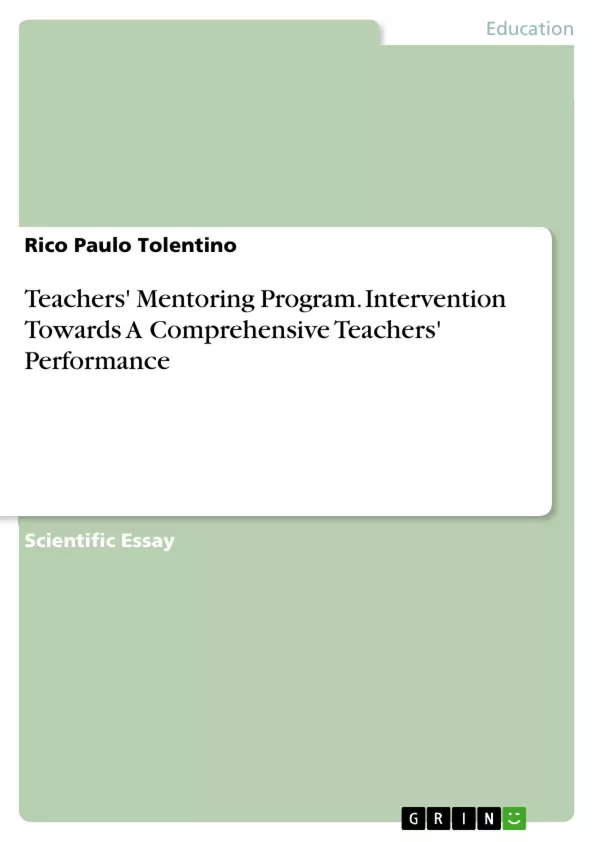The context of this research is to improve the performance of Technology and Livelihood Education of teachers through the implementation of Teachers’ Mentoring Program (TMP) as organizational intervention.
Teachers’ Mentoring Program helps the teachers to have a higher level of performance in achieving the key result areas in terms of teaching and learning process, student outcomes, community involvement, and professional development. The findings of no significant difference during the first grading period to the data interpretation of a highly significant difference during the second grading period, the researcher rejects the null hypothesis stated on the earlier part of this study in terms of teaching and learning process, students’ outcomes, community involvement, and professional growth and development.
This implies that Teachers’ Mentoring Program is highly significant organizational intervention toward improvement of a comprehensive performance of teachers in TLE. These findings suggest the need for further research on its implementation to other subject areas and to a wider scope.
Frequently asked questions
What is the study about?
The study investigates the effectiveness of a Teachers' Mentoring Program (TMP) on the comprehensive performance of Technology and Livelihood Education (TLE) teachers.
What are the key areas of teacher performance being evaluated?
The study assesses teacher performance in four key areas: Teaching-Learning Process, Student Outcomes, Community Involvement, and Professional Growth and Development.
What is the statement of the problem?
The study aims to determine the extent of effectiveness of Teachers' Mentoring Program (TMP) on the level of comprehensive teacher's performance.
What questions does the study seek to answer?
The study seeks to answer the following questions:
- What is the level of teacher's performance in terms of Teaching-Learning Process, Student Outcomes, Community Involvement, and Professional Growth and Development?
- How may the Teachers' Mentoring Program help the teachers in achieving high level of comprehensive performance?
- Is there a significant difference on teacher's levels of performance as they undergo Teachers' Mentoring Program?
- How do teachers perform their tasks with the help of Teachers' Mentoring Program?
- How Teachers' Mentoring Program improves the performance of teachers comprehensively?
What methodology is used in the study?
The study employs a mixed-methods approach, utilizing both quasi-experimental and narrative-phenomenological research designs. A control group is used to validate the effectiveness of the Teacher's Mentoring Program.
What are some of the findings related to the Teaching and Learning Process?
The study found that the percentage of submitted daily lesson logs (DLLs) improved after the implementation of the TMP, indicating enhanced efficiency in task completion.
What are the findings related to Student Outcomes?
The study reveals a statistically significant improvement in student Mean Percentile Scores (MPS) for teachers participating in the TMP compared to a control group. The MPS improved from 61.68 to 70.29 with an observed significance of 0.020.
What is the EACH-ONE-MENTOR-ONE (O-E-M-O) Model?
The Each-One-Mentor-One is a framework for spreading the skills and competencies gained during mentor-mentee sessions. Each TLE teacher will then use those skills in another mentor-mentee session.
What were the overall findings of the study?
The study suggests that the Teachers' Mentoring Program (TMP) improves teacher performance comprehensively across multiple dimensions. Also TMP has proven to be statistically significant in improvements in the Mean Percentile Scores (MPS) of the teachers being analyzed.
What are the recommendations based on the study's findings?
The study recommends the implementation of TMP in other subject areas, encourages principals to expand mentoring programs, suggests DepEd include teacher mentoring in training, and proposes further research on student mentoring and mentoring for department heads.
- Citar trabajo
- Dr. Rico Paulo Tolentino (Autor), 2016, Teachers' Mentoring Program. Intervention Towards A Comprehensive Teachers' Performance, Múnich, GRIN Verlag, https://www.grin.com/document/338595



